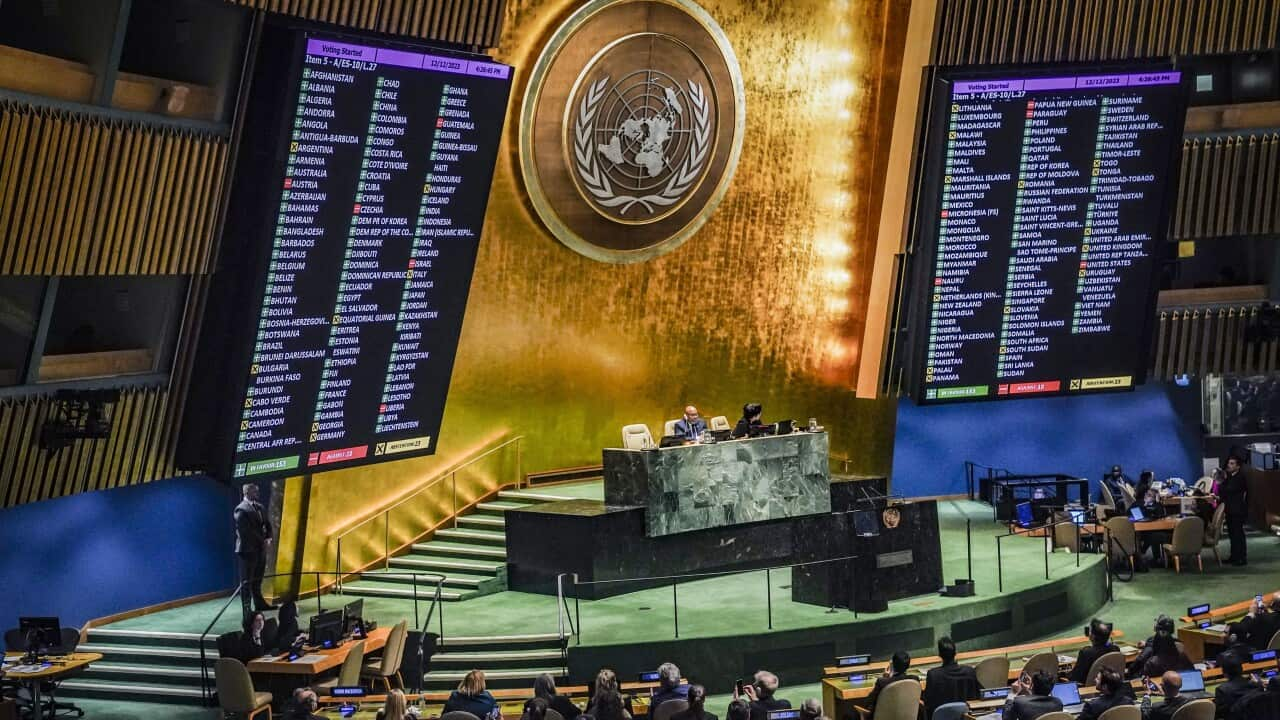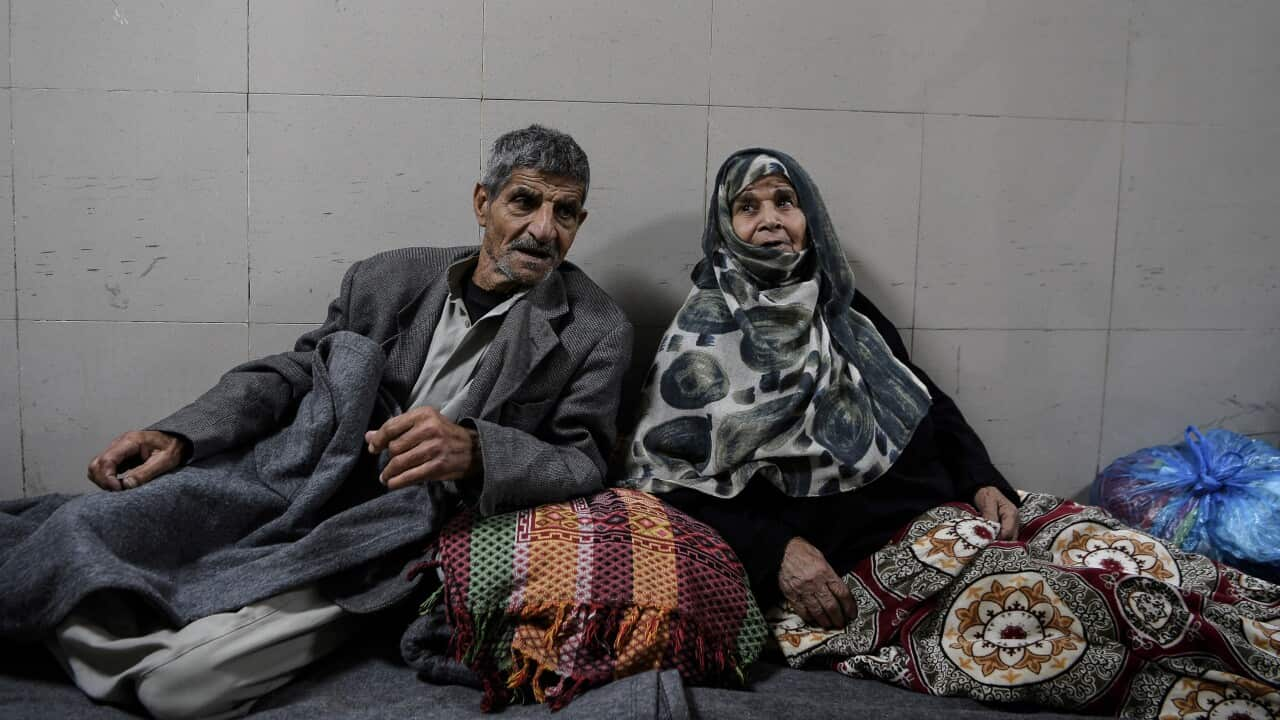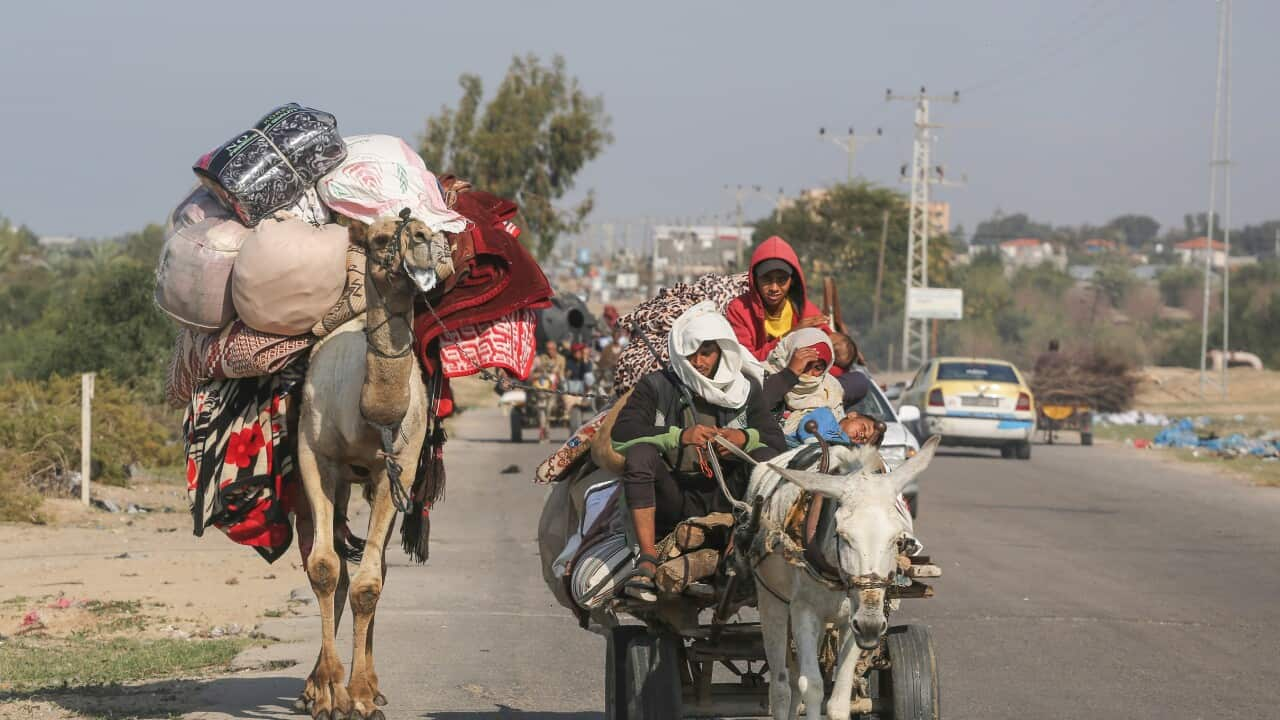Key Points
- Australia, Canada and New Zealand have backed moves towards a ceasefire between Hamas and Israel.
- The UN General Assembly has adopted a resolution demanding an immediate humanitarian ceasefire in Gaza.
- US President Joe Biden has launched his most pointed criticism of Israel since its post-7-October assault began.
Prime Minister Anthony Albanese has declared the price of defeating Hamas "cannot be the continuous suffering of all Palestinian civilians", as Australia joined 152 other countries in demanding an immediate humanitarian ceasefire in Gaza.
US President Joe Biden has also launched his most pointed criticism of Israel since its bombardment of the densely-populated strip began, describing its attacks as "indiscriminate" and warning it was losing international support.
More than three-quarters of the 193-member UN General Assembly voted for a humanitarian ceasefire on Wednesday morning, leaving the US as one of 10 countries to vote no.
The US vetoed the call at the UN Security Council last week but did not have the power to do so in the General Assembly.
Australia was among the 153 member states to vote in favour of the General Assembly resolution, while 23 countries abstained. General Assembly resolutions are not binding but carry political weight, reflecting a global view on the war.
Australia releases joint statement with New Zealand and Canada
And in a rare joint statement also signed by the leaders of New Zealand and Canada, Albanese called for hostilities to be paused and a "sustainable ceasefire” to be pursued.
"We recognise Israel’s right to exist and right to defend itself. In defending itself, Israel must respect international humanitarian law," the three leaders said.

A Palestinian woman holds her child after an Israeli strike on her neighborhood in Rafah, Gaza Strip. Source: AAP / Fatima Shbair/AP
Health authorities in the Hamas-run Gaza has passed 18,000.
"We remain deeply concerned by the scale of the humanitarian crisis in Gaza and ongoing risks to all Palestinian civilians. Safe and unimpeded humanitarian access must be increased and sustained.”
The joint statement condemned Hamas' attack on Israel on 7 October and the "heinous acts of violence perpetrated in those attacks, including sexual violence", after militants killed 1,200 people and took more than 200 hostages.
Albanese, New Zealand Prime Minister Chris Luxon and Canadian Prime Minister Justin Trudeau also said any ceasefire "cannot be one-sided".
"Hamas must release all hostages, stop using Palestinian civilians as human shields and lay down its arms."
The three leaders condemned "Hamas' unacceptable treatment of hostages" and called for the immediate and unconditional release of the captives.
The three governments recognised Israel's right to defend itself.
"In defending itself, Israel must respect international humanitarian law," they added.
There was also "no role for Hamas in the future governance of Gaza", the leaders said while opposing "the forcible displacement of Palestinians from Gaza, , any reduction in territory and any use of siege or blockade" and backed a two-state solution.

Palestinian children wounded in the Israeli bombardment of the Gaza Strip are brought to the hospital in Deir al Balah, Gaza Strip. Source: AAP / Adel Hana/AP
Wong urges 'critical step' to reach 'sustainable ceasefire'
On Wednesday morning, Foreign Minister Penny Wong said humanitarian pauses in fighting are a "critical step" towards a "sustainable and permanent ceasefire" in the Hamas-Israel war.
"We see the pauses as a critical step on the path to a sustainable and permanent ceasefire," Wong told reporters in Adelaide on Wednesday.
"As I have said previously, such a ceasefire cannot be one-sided."
The significant escalation in violence since 7 October is the latest boiling point in a long-standing conflict between Israel and Hamas.
Hamas is a Palestinian military and political group, which has gained power in the Gaza Strip since winning legislative elections there in 2006. Its stated aim is to establish a Palestinian state, while refusing to recognise Israel's right to exist.
Hamas, in its entirety, is designated as a terrorist organisation by countries including Australia, Canada, the UK and the US. New Zealand and Paraguay list only its military wing as a terrorist group. In 2018, the United Nations General Assembly voted against a resolution condemning Hamas in its entirety as a terrorist organisation.
The statement comes as Opposition foreign affairs spokesman Simon Birmingham leads a cross-party delegation to Israel.
"There is no point ... in a premature situation that would enable Hamas to rearm, to regroup, and ultimately pose the threat of conducting the same type of terrorist atrocities as they did on the seventh of October," he told Sky News.
Joe Biden says Israel losing support
US President Joe Biden said Israel is losing support over its "indiscriminate" bombing of Gaza and that Benjamin Netanyahu should change his hardline government, exposing a new rift in relations with the Israeli prime minister.
Biden's remarks, made to donors to his 2024 re-election campaign, were his most critical to date of Netanyahu's handling of Israel's war in Gaza. They are a stark contrast to his literal and political embrace of the Israeli leader days after Hamas militants' 7 October attack on southern Israel.
"Israel's security can rest on the United States, but right now it has more than the United States. It has the European Union, it has Europe, it has most of the world ... But they're starting to lose that support by indiscriminate bombing that takes place," Biden said.
Biden's remarks gave an insight into his blunt private conversations with Netanyahu, with whom he has had deep disagreements for decades.
Biden alluded to a private conversation in which the Israeli leader said: "You carpet-bombed Germany, you dropped the atom bomb, a lot of civilians died".
Biden said he responded: "Yeah, that's why all these institutions were set up after World War Two to see to it that it didn't happen again ... don't make the same mistakes we made in 9/11. There's no reason why we had to be in a war in Afghanistan."
Netanyahu said in a statement on Tuesday that Israel had received "full backing" from the US for its ground incursion into Gaza and that Washington had blocked "international pressure to stop the war".
But he added: "There is disagreement about 'the day after Hamas' and I hope that we will reach agreement here as well."
Biden specifically mentioned Israel's far-right politician Itamar Ben-Gvir, who is Israel's national security minister, and said, "this is the most conservative government in Israel's history."
"He (Netanyahu) has to change this government. This government in Israel is making it very difficult," Biden said.
He also said that ultimately Israel "can't say no" to a Palestinian state, which Israeli hardliners oppose.











